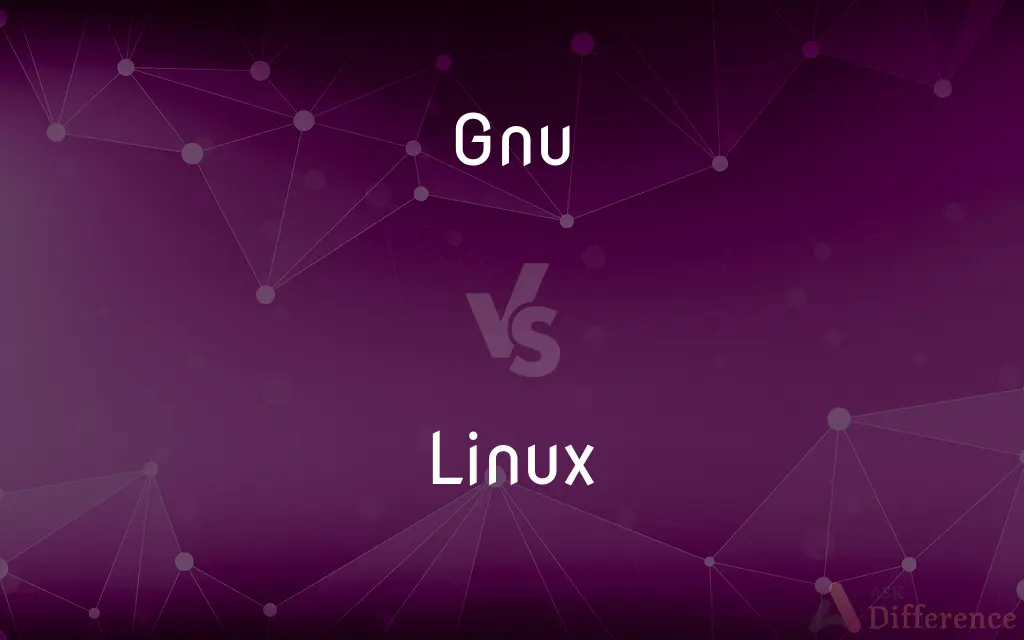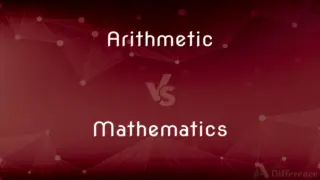GNU vs. Linux — What's the Difference?
By Tayyaba Rehman — Updated on November 6, 2023
GNU is a collection of free software, while Linux is an operating system kernel.

Difference Between GNU and Linux
Table of Contents
ADVERTISEMENT
Key Differences
GNU, standing for "GNU's Not Unix," is a project initiated by Richard Stallman to create a free Unix-like operating system, consisting of free software. Linux, in contrast, refers specifically to the kernel, or the core part of an operating system, created by Linus Torvalds. The GNU project has developed a comprehensive collection of free software, which when combined with the Linux kernel, forms a complete operating system commonly referred to as Linux, though accurately called GNU/Linux.
While Linux is the kernel that manages hardware resources, the GNU project provides the essential components of an operating system, such as utilities and applications. Without the Linux kernel, GNU's tools would lack a critical layer that interfaces with the hardware. Conversely, without GNU's tools, Linux would operate only as a kernel without the necessary user environment and utilities to perform tasks.
The GNU project began before the Linux kernel was developed and was intended to include a kernel called GNU Hurd, which is still in development. The Linux kernel, however, was successful and became popular quickly, leading to its combination with the GNU system to create a fully functional OS. It's this combination that most people refer to as "Linux" today.
Linux is often credited for the proliferation of open-source software in the mainstream computing world, providing a reliable kernel that can be used in various distributions like Ubuntu, Fedora, and Debian. These distributions are often a blend of GNU tools and the Linux kernel, showcasing how intertwined the two projects have become. GNU's philosophy centers around freedom in software, while Linux's success is rooted in its robust performance, security, and support.
Comparison Chart
Primary Focus
Collection of free software
Kernel of an operating system
ADVERTISEMENT
Originator
Richard Stallman
Linus Torvalds
Initiated
1983
1991
Core Philosophy
Software freedom
Efficient, modular kernel
Component of
Operating system utilities
Central part of the OS that manages hardware
Compare with Definitions
Gnu
Free software project.
I contribute to the GNU project.
Linux
Kernel used in various distributions.
Ubuntu is one of the most popular Linux distros.
Gnu
Open-source operating system initiative.
GNU's philosophy promotes software freedom.
Linux
Open-source operating system kernel.
Linux powers the majority of web servers.
Gnu
Unix-like system without Unix code.
GNU utilities are installed by default on most Linux distributions.
Linux
Freely distributed kernel software.
Linux has a strong community of developers.
Gnu
Collective name for GNU software.
GNU Emacs is an extensible, customizable text editor.
Linux
Central part of many embedded systems.
Android is based on the Linux kernel.
Gnu
Project with its own kernel (Hurd).
GNU Hurd is an alternative to the Linux kernel.
Linux
Core of GNU/Linux operating system.
The Linux kernel handles the system's hardware.
Gnu
Either of two large African antelopes (Connochaetes gnou or C. taurinus) having a drooping mane and beard, a long tufted tail, and curved horns in both males and females. Also called wildebeest.
Linux
Linux ( (listen) LEEN-uuks or LIN-uuks) is a family of open-source Unix-like operating systems based on the Linux kernel, an operating system kernel first released on September 17, 1991, by Linus Torvalds. Linux is typically packaged in a Linux distribution.
Gnu
A large antelope of the genus Connochaetes, native to Africa, having curved horns.
Linux
An open-source operating system modelled on UNIX.
Gnu
Large African antelope having a head with horns like an ox and a long tufted tail
Linux
(software) Any unix-like operating system that uses the Linux kernel.
Linux
An open-source version of the UNIX operating system
Common Curiosities
Can GNU operate without Linux?
GNU can function with other kernels like GNU Hurd, but it's commonly used with Linux.
Who started the GNU project?
Richard Stallman started the GNU project in 1983.
Who created Linux?
Linus Torvalds developed the Linux kernel in 1991.
Why do some people say GNU/Linux?
They want to emphasize that the typical "Linux" system is really GNU tools with the Linux kernel.
What's a common GNU tool?
Bash, the GNU project's shell, is a common tool found in many Linux distributions.
How do GNU and Linux contribute to open source?
GNU provides essential software tools, and Linux provides a reliable kernel, both fostering the open-source ecosystem.
What is GNU?
GNU is a collection of free software that together can form an operating system.
What is the main goal of GNU?
The main goal of GNU is to create and distribute software that is free for users to run, modify, and share.
Can you use GNU tools on non-Linux operating systems?
Yes, GNU tools can be used on various operating systems like BSD or macOS.
What is Linux?
Linux is an operating system kernel that interfaces with hardware.
Does Linux follow the same free software principles as GNU?
Linux is released under the GPL, a free software license, but the kernel itself is not part of the GNU project.
Is Linux an operating system on its own?
No, Linux itself is just the kernel; it needs other components like GNU to form a complete OS.
Is GNU software available for commercial use?
Yes, GNU software is free to use, modify, and distribute, even commercially.
Are all Linux distributions part of the GNU project?
No, not all Linux distributions are directly related to the GNU project.
Is Linux the only kernel that can be used with GNU tools?
No, there are other kernels like the GNU Hurd that can be used with GNU tools.
Share Your Discovery

Previous Comparison
Arithmetic vs. Mathematics
Next Comparison
Candlestick vs. CandleholderAuthor Spotlight
Written by
Tayyaba RehmanTayyaba Rehman is a distinguished writer, currently serving as a primary contributor to askdifference.com. As a researcher in semantics and etymology, Tayyaba's passion for the complexity of languages and their distinctions has found a perfect home on the platform. Tayyaba delves into the intricacies of language, distinguishing between commonly confused words and phrases, thereby providing clarity for readers worldwide.
















































